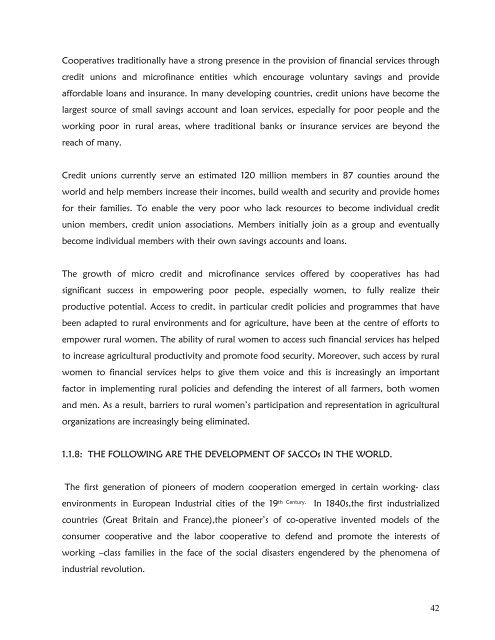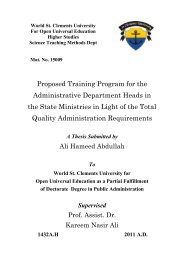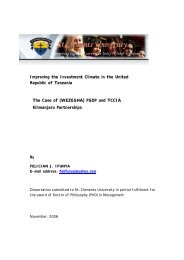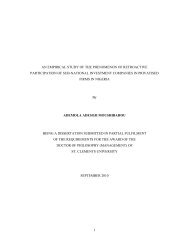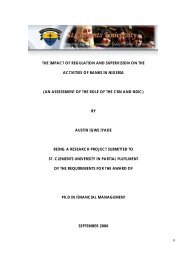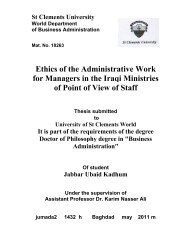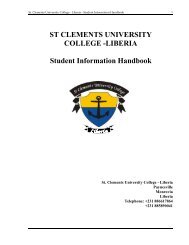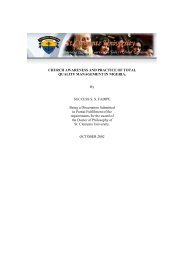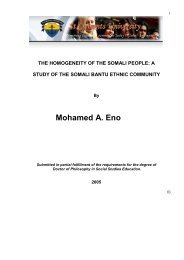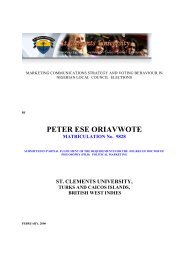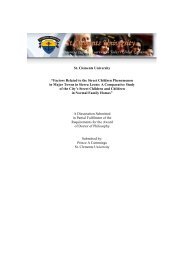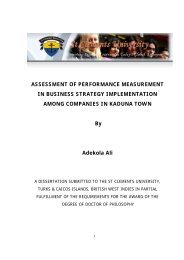The role of informal microfinance institutions in saving
The role of informal microfinance institutions in saving
The role of informal microfinance institutions in saving
Create successful ePaper yourself
Turn your PDF publications into a flip-book with our unique Google optimized e-Paper software.
Cooperatives traditionally have a strong presence <strong>in</strong> the provision <strong>of</strong> f<strong>in</strong>ancial services through<br />
credit unions and micr<strong>of</strong><strong>in</strong>ance entities which encourage voluntary sav<strong>in</strong>gs and provide<br />
affordable loans and <strong>in</strong>surance. In many develop<strong>in</strong>g countries, credit unions have become the<br />
largest source <strong>of</strong> small sav<strong>in</strong>gs account and loan services, especially for poor people and the<br />
work<strong>in</strong>g poor <strong>in</strong> rural areas, where traditional banks or <strong>in</strong>surance services are beyond the<br />
reach <strong>of</strong> many.<br />
Credit unions currently serve an estimated 120 million members <strong>in</strong> 87 counties around the<br />
world and help members <strong>in</strong>crease their <strong>in</strong>comes, build wealth and security and provide homes<br />
for their families. To enable the very poor who lack resources to become <strong>in</strong>dividual credit<br />
union members, credit union associations. Members <strong>in</strong>itially jo<strong>in</strong> as a group and eventually<br />
become <strong>in</strong>dividual members with their own sav<strong>in</strong>gs accounts and loans.<br />
<strong>The</strong> growth <strong>of</strong> micro credit and micr<strong>of</strong><strong>in</strong>ance services <strong>of</strong>fered by cooperatives has had<br />
significant success <strong>in</strong> empower<strong>in</strong>g poor people, especially women, to fully realize their<br />
productive potential. Access to credit, <strong>in</strong> particular credit policies and programmes that have<br />
been adapted to rural environments and for agriculture, have been at the centre <strong>of</strong> efforts to<br />
empower rural women. <strong>The</strong> ability <strong>of</strong> rural women to access such f<strong>in</strong>ancial services has helped<br />
to <strong>in</strong>crease agricultural productivity and promote food security. Moreover, such access by rural<br />
women to f<strong>in</strong>ancial services helps to give them voice and this is <strong>in</strong>creas<strong>in</strong>gly an important<br />
factor <strong>in</strong> implement<strong>in</strong>g rural policies and defend<strong>in</strong>g the <strong>in</strong>terest <strong>of</strong> all farmers, both women<br />
and men. As a result, barriers to rural women’s participation and representation <strong>in</strong> agricultural<br />
organizations are <strong>in</strong>creas<strong>in</strong>gly be<strong>in</strong>g elim<strong>in</strong>ated.<br />
1.1.8: THE FOLLOWING ARE THE DEVELOPMENT OF SACCOs IN THE WORLD.<br />
<strong>The</strong> first generation <strong>of</strong> pioneers <strong>of</strong> modern cooperation emerged <strong>in</strong> certa<strong>in</strong> work<strong>in</strong>g- class<br />
environments <strong>in</strong> European Industrial cities <strong>of</strong> the 19 th Century. In 1840s,the first <strong>in</strong>dustrialized<br />
countries (Great Brita<strong>in</strong> and France),the pioneer’s <strong>of</strong> co-operative <strong>in</strong>vented models <strong>of</strong> the<br />
consumer cooperative and the labor cooperative to defend and promote the <strong>in</strong>terests <strong>of</strong><br />
work<strong>in</strong>g –class families <strong>in</strong> the face <strong>of</strong> the social disasters engendered by the phenomena <strong>of</strong><br />
<strong>in</strong>dustrial revolution.<br />
42


